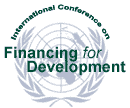
Department of Public Information - News and Media Services Division - New York
18-22 March 2002
18 March 2002
 |
International
Conference on Financing for Development Department of Public Information - News and Media Services Division - New York |
|
| Monterrey, NL, Mexico 18-22 March 2002 |
18 March 2002 |
|
PRESS CONFERENCE BY FAO, IFAD, WFP
The underfunding of sectors from which the poor derived their livelihoods was among the major reasons for world hunger, Hartwig de Hean, Assistant Director-General of the Food and Agriculture Organization (FAO), said this morning.
At a press conference on the role of rural development, food and agriculture in making aid more effective, he said hunger was not only a consequence of poverty, but also one of its major causes. World hunger had been reduced at a rate of 6 million people a year in the 1990s, whereas a reduction rate of 32 million was required.
Holding a joint press conference with the International Fund for Agricultural Development (IFAD) and the World Food Programme (WFP), he said the common position of the three Rome-based agencies should send a strong signal to the Conference, which should give top priority to hunger reduction as agreed at the 1996 World Food Summit. General agreement on the need to reduce hunger was not enough.
While the Conference was not expected to have a sectoral emphasis, he stressed that agriculture was not just another sector. It was the backbone of the economy in most developing countries, especially those with the greatest levels of hunger. The three agencies called for a twin-track approach to hunger reduction by combining food-production support with investments to raise productivity.
Lennart Bage, President of IFAD, said it was clear that not enough had been done either to mobilize the political will required to achieve the Millennium Summit goals or to channel resources where they could be most effectively spent to eradicate poverty by 2015.
Noting that the great majority of the 1.2 billion poor living on less than a dollar a day lived in rural areas, he said that, with a greater focus on social development, the rural poor were neglected. The focus must be not only on health and education, but also on increasing food production and the purchasing power of the poor, as well as on boosting the productive base to generate the resources needed to overcome the imbalance.
Jean-Jacques Graisse, Deputy Executive Director of the WFP, said the agency had been very successful in fighting highly visible cases of starvation, spending close to $1.5 billion. But there was no money for hundreds of millions of starving people who were not in the limelight. They faced slow and invisible starvation. The world should not be satisfied with saving the victims of war, drought and floods, but must also spend on school feeding and nutrition programmes for school children and pregnant and nursing mothers.
Asked to describe the impact of the current emphasis on military spending for the war in Afghanistan and a possible attack on Iraq, Mr. Bage said there was a growing realization of the necessity not only to fight terrorism, but also the causes of such breeding grounds as poverty and failed States. There must be a short-term and longer-term approach to the anti-terrorism war. Without a commitment to development, there would be growing instability.
Another correspondent asked whether the Monterrey consensus strengthened the momentum for trade negotiations.
Mr. Bage replied that the document was an agreed platform, which must now create momentum to go further. Farmers in developing countries faced not only tariff and other barriers, but also export-subsidized competition from developed countries. That was one of the foremost areas for trade negotiations. Making a start to improving that situation was an extremely important priority.
Another journalist asked whether there was any evidence that the countries of the Organization for Economic Cooperation and Development (OECD) were willing to open their markets to the developing countries.
Mr. Bage noted two positive signs: the European Union's so-called "everything but arms" decision giving access to the least developed countries, and the growing debate on the effects of the present system. Those factors could lead to change and improvements, but that would not happen automatically, he added.
Mr. Graisse said that another positive sign was the outcome of the Doha World Trade Organization Summit, which had recognized that developing countries must have a greater say. The wealthy countries must not only give market access, but also help to build capacity in the developing world as part of a necessary pro-poor financing effort.
Press Conferences
Conference News